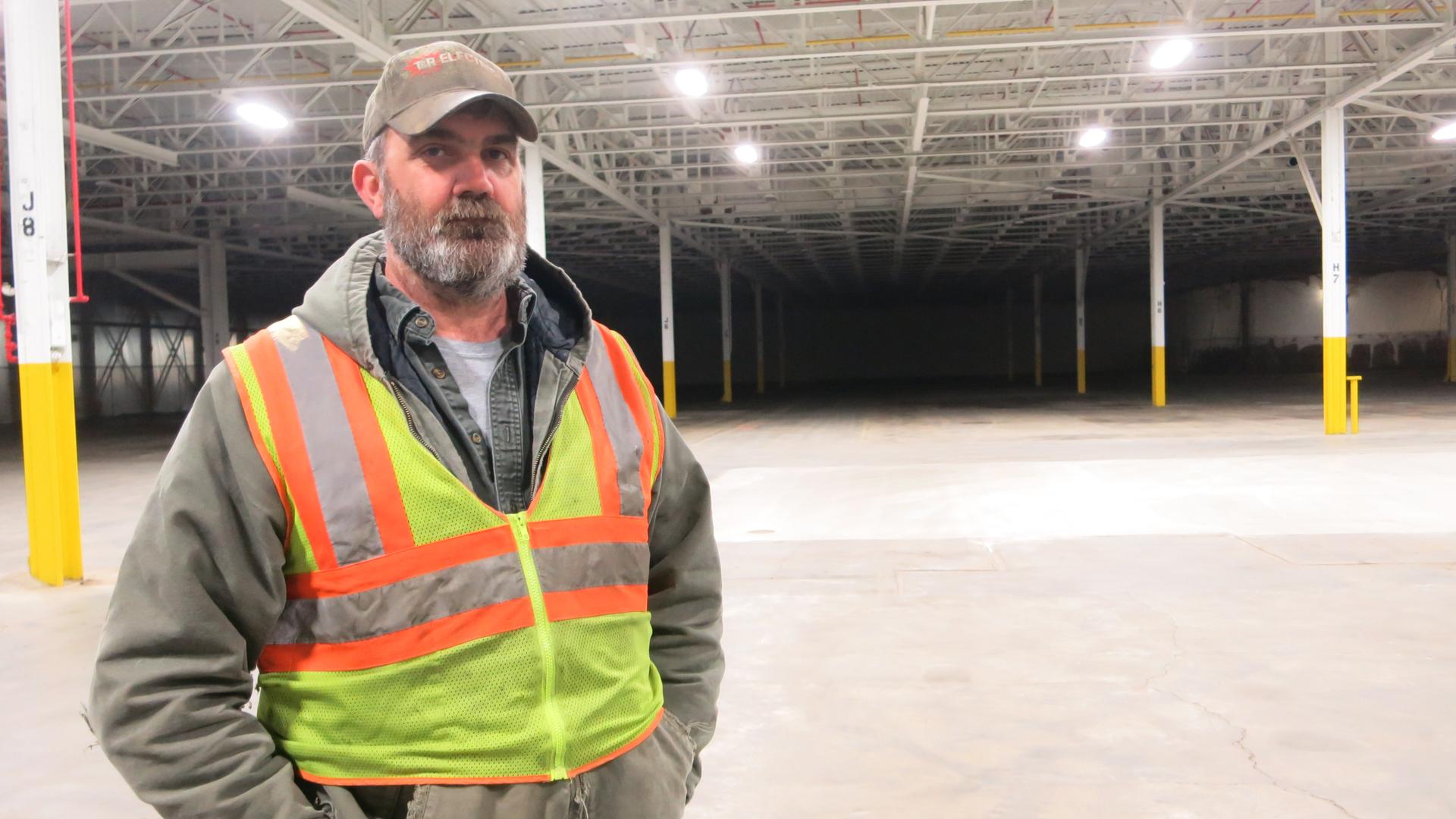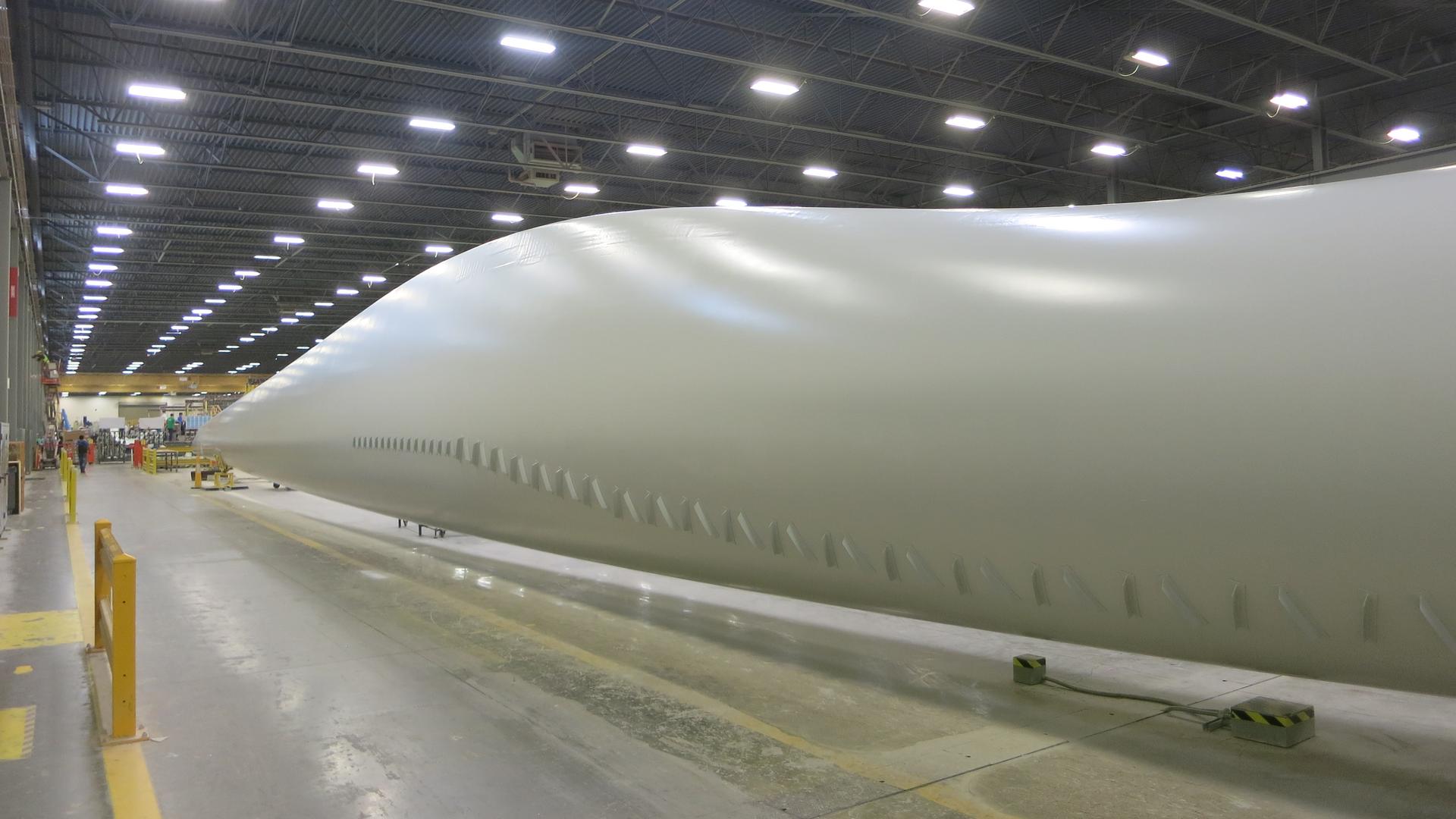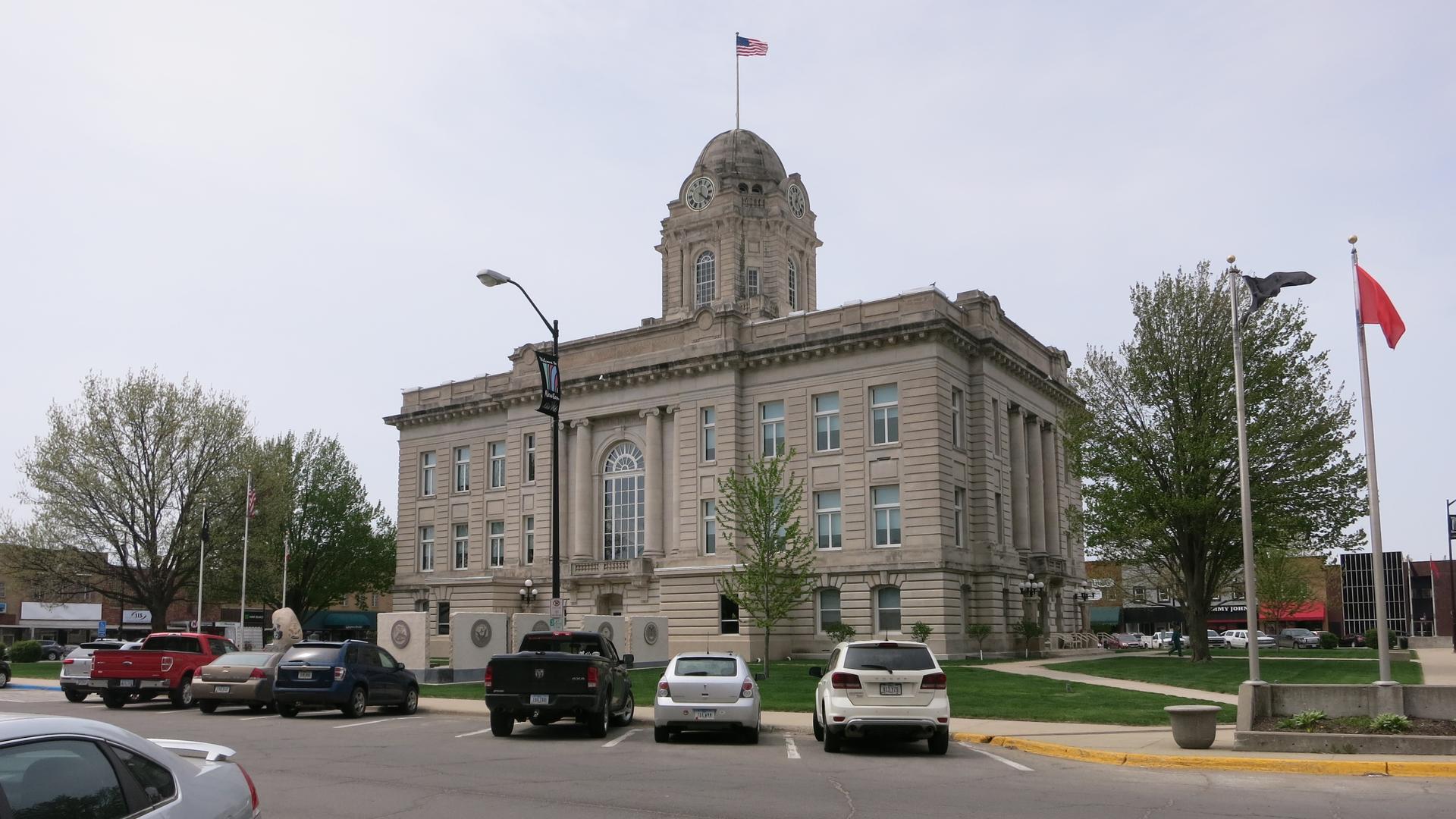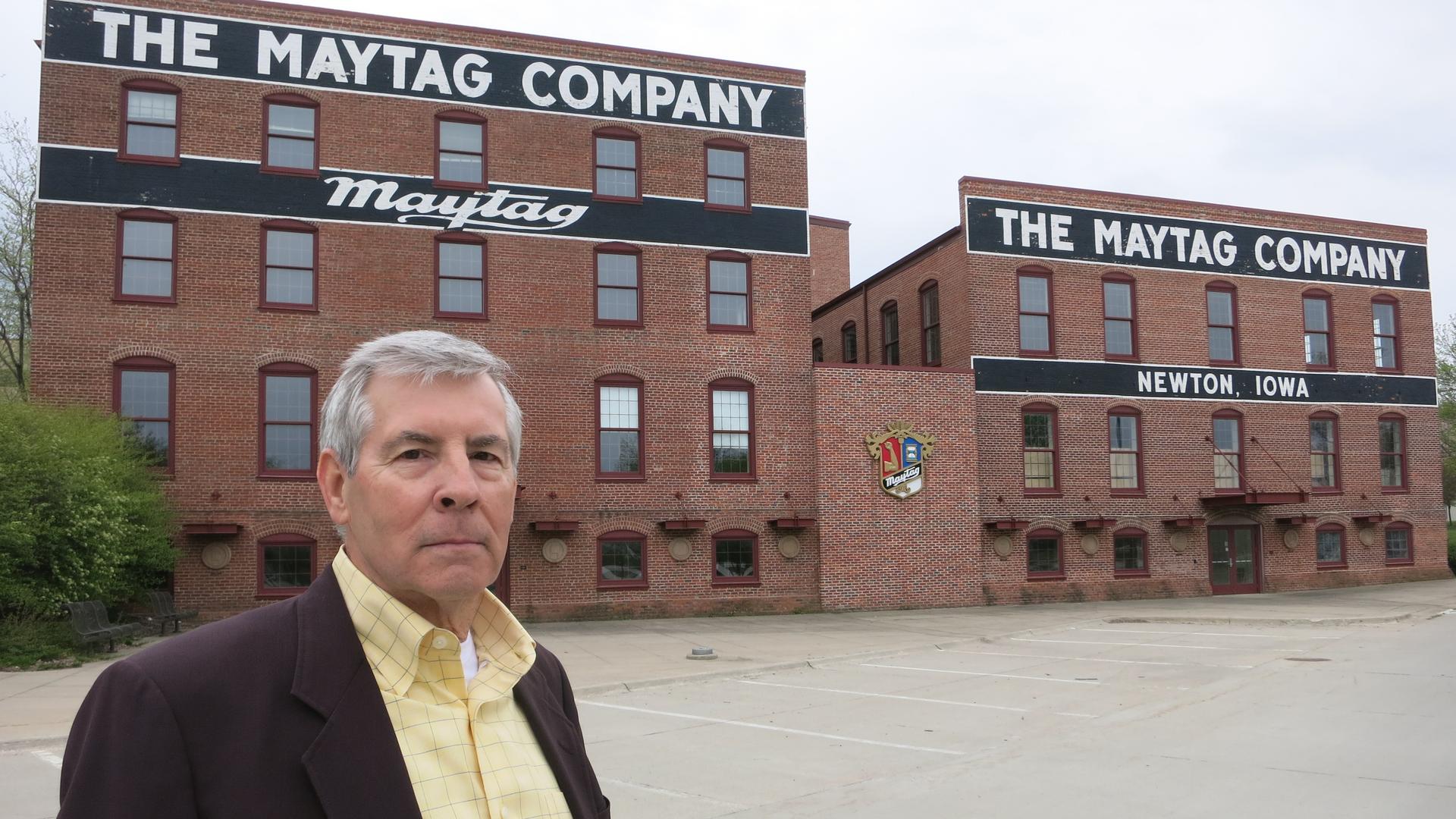Frank Liebl, executive director of the Newton Development Corporation, is pictured in front of the old Maytag headquarters. Community leaders are working to rent out the space where 2,000 people once worked.
For more than a century, Newton, Iowa, was the quintessential company town. Maytag started building washing machines there in 1893. The company grew into a global brand, and Newton, a city of 15,000, prospered along with it.
When Maytag closed its doors in 2007, it was a rough transition. At the time, some 2,000 people were building washers and dryers at the old Maytag manufacturing facility. The cavernous building is the size of seven average-sized Walmarts.
Jim Schutte, a burly man who stands at 6 feet 8 inches, was a machine repairman with Maytag for 21 years. He lost his job in 2006 when Whirlpool bought Maytag and shifted manufacturing to other states and Mexico.
“[I] just moved on, gotta do what you gotta do,” said Schutte.
Three years after Maytag left, "60 Minutes" declared, "Since the recession, we've seen a lot of troubled towns in the country, but nothing that looks quite as broken as Newton."
Today, a handful of tenants rent warehouse space at the old Maytag facility, and Schutte manages the property, patrolling the largely vacant warehouse where he spent two decades of his working life.
“It used to bother me at first, but not anymore. It will bother me Aug. 17th because that’s when I would’ve had my 30 years in,” said Schutte. “That’s when I could’ve retired. At Maytag, you had your full medical benefits and a nice pension when you retired with 30 years in.”
When does he think he’ll retire now?
“Probably never,” he said with a laugh.

Now, at this point you might be thinking, OK, here’s another profile of a dying manufacturing city and the people that got left behind. Wrong, not Newton, Iowa.
“The unemployment rate in 2009 was 9.9 percent, and today it’s at 3.5 percent,” said Frank Liebl, executive director of the Newton Development Corporation. It’s his job to attract new businesses to the area.
Since Maytag left, community leaders have helped attract a lot of new employers with a simple pitch: We’re ready to work.
“When you lose that many people out of a community, all of a sudden companies say, ‘Wow, I’m going to come to Newton, Iowa, because they’ve got the infrastructure, they’ve got the buildings, and they’ve got the workforce,’” said Liebl.
But a lot of American cities could make that pitch. What’s different about Newton? For one thing, the population has held stable. The buildings and streets are also clean and well maintained. So, how did Newton get back on its feet when so many other small manufacturing cities throughout the Midwest hit hard times and shriveled up?
For starters, new employers opened up shop in Iowa, including an Arizona-based company that makes wind turbine blades — TPI Composites. Today at its Newton factory, TPI pumps out 27 blades a week that stretch 187 feet in length (three blades make a set).
“When TPI was looking to expand in the Midwest, Newton gave some tax incentives, some abatements for new companies to come,” said Amy Leavitt, TPI’s community and associate relations coordinator.
All told, the city, county and state of Iowa gave TPI $8 million in loans, grants and tax breaks.
Since arriving in Newton a decade ago, TPI has grown from a handful of workers to more than 1,100. Mindy Pollock, who cuts fiberglass for wind blades, had been at Maytag for 22 years when she was let go.
“I’ve seen grown men crying that day,” said Pollock.
While she was out of work for eight months, she took advantage of some job retraining for laid-off workers.
“I actually took a computer class, just the basic computer class,” said Pollock. “The older you get, the less you know about that kind of technology, so it did help me.”
Now, she uses a computer every day at her new job.

OK, at this point, you may be thinking, I see, so this is a story about a manufacturing city that’s figured things out. Not exactly that, either.
Economist Dave Swenson at Iowa State University says Newton has indeed stopped its decline, but it hasn’t fully recovered. Jobs building wind blades are great, and TPI has helped Newton’s job base tremendously, but those jobs just don’t pay as well as the old Maytag positions.
In 2001, the going rate for manufacturing work in Jasper County, for which Newton is the county seat, was 37 percent above Iowa’s state average.
“In 2015, it was about 20 percent below the state average,” said Swenson. “And so the standard of living for the workforce has gone down measurably.”
And that job retraining program that helped Mindy Pollock find work building wind blades — well, classes aren’t for everyone. When Jim Schutte was laid off, he and many others said, No thanks.
“I had enough of school when I was in it,” said Schutte.
It’s hard to blame him for not wanting to go back.
Economist Dave Swenson says more education and learning new trades are good things, but, “Thinking you can just come on in and then say, ‘OK, we’re going to train you to be this as opposed to that,’ there are so many failures. And by the time somebody does get trained in something, oftentimes, it’s already too late, that sector isn’t hiring anymore. We’re really, really bad at figuring out what the next thing is.”
There’s also the problem of too much hope that life will somehow go back to “normal” — many union manufacturing jobs of the 20th century required little education but offered good pay and benefits. Swenson said that too many Midwestern cities and politicians are trying to re-create that past.
“Their mindset is we just need to replace these jobs with manufacturing, 'Make America Great Again,' re-employ workers in the manufacturing sector,” said Swenson. “It’s not as simple as that.”
Still, President Donald Trump’s message caught on like wildfire around Newton. Barack Obama won Jasper County in 2008 and 2012. Trump demolished Hillary Clinton there last November.
But can President Trump, or any president, bring back manufacturing jobs to the heartland?
“No, and I think about the years that we’ve seen individual communities trying to do it. We’ve seen states trying to do it, so it’s not like nobody has thought of it before,” said Liesl Eathington, an economist also at Iowa State University. “When you think about 20, 30, 40 years of economic development strategies, it’s the same thing — it’s just got new words attached to it.”
Still, the economists at Iowa State say that doesn’t mean you just throw your hands in the air and give up. They say industrial cities need to look forward, not back, and diversify their economies.
Amanda Price with the Newton Chamber of Commerce says her city has embraced that message.
“We’re trying to stay ahead of the game so that things like Maytag don’t happen again," she said. "I hate to say it, but the city put all its eggs in one basket for so many years.”
But why wouldn’t the city do that? Life was good in Newton for a long, long time. And Maytag was a good corporate citizen — it paid for things like community parks, the local aquatic center and the auditorium. Today, a lot of people in Newton remain bitter that Maytag left that all behind.
Newton’s downtown square has its charms — a central courthouse ringed by coffee shops, stores and restaurants, no boarded-up windows. It’s not Paris, but it’s certainly not depressed.

Price wants her city to move past Maytag, emotionally. She said when the company left, it was like somebody died.
“It was, it literally was. We’ve actually talked about having a major community event where we actually have a funeral, and we bury Maytag for good,” said Price. “People could bring their Maytag stuff if they still have something, and just let it go. I don’t know, maybe that would be something that would be therapeutic.”
This piece is a part of the series 50 States: America's place in a shrinking world. Become a part of the project and share your story with us.
